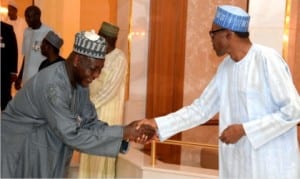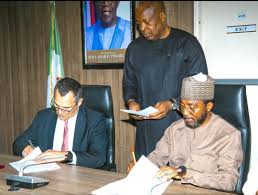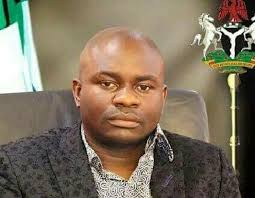News
I Didn’t Spend $2.1bn Without Approval -Okonjo-Iweala

President Muhammadu Buhari ( right) in a handshake with the Clerk of the National Assembly, Salisu Maikasuwa after breaking of Ramadan Fast at the Presidential Villa Abuja, last Monday
The former Minister of Finance and Coordinating Minister of the Economy, Dr Ngozi Okonjo—Iweala, has denied allegations by some governors that she spent $2.1 billion out of the Excess Crude Account “without authorisation”.
In a statement yesterday, spokesman for the minister, Paul Nwabuikwu, described the allegation as false, malicious and totally without foundation.
The Governor of Edo State, Adams Oshiomhole and his Kaduna State counterpart, Malam, Nasir el-Rufai, had said that the National Economic Council, at a meeting on Monday, found that $2.1 billion of the Excess Crude Account was spent without the approval of the council.
The former minister said no unauthorized expenditure from the ECA was made under her watch in the Finance Ministry, and that decisions on such expenditure were discussed at meetings of the Federation Accounts Allocation Committee (FAAC) attended by finance commissioners from the 36 states.
“It is curious that in their desperation to use the esteemed National Economic Council for political and personal vendetta, the persons behind these allegations acted as if the constitutionally recognized FAAC, a potent expression of Nigeria’s fiscal federalism, does not exist,” the statement said.
“But Nigerians know that collective revenues, allocations and expenditures of the three tiers of government are the concern of the monthly FAAC meetings.
“It is important to acknowledge the efforts of governors who are working hard to overcome the current revenue challenges facing their states without resorting to character assassination and blame games,” it said.
The former minister said she remained ready and willing to respond to legitimate enquiries about issues under her purview as Finance Minister.
“But it is clear that this is the latest chapter of a political witch-hunt by elements who are attempting to use the respected National Economic Council for ignoble purposes having failed abysmally in their previous attempts to tar the Okonjo-Iweala name.
“It will be recalled that one of such attempts took place in May when some of these governors, hiding under the auspices of the Nigerian Governors Forum asked Okonjo-Iweala to explain $20 billion alleged to be missing from the same ECA.
“The Finance Ministry subsequently issued a news release and published an advertorial in national newspapers on May 25, 2015 giving details of what the Federal Government and states received from the ECA in the last four years. It also provided details of the use of the funds for payment of petrol subsidies for the Nigerian public and SURE-P allocations to the three tiers for development purposes.
“After the publication, the accusers lost their voice. But the latest allegations show that these persons are still in the business of throwing up wild, unsubstantiated figures to damage Okonjo-Iweala’s name. For instance, within the last few months, Governor Oshiomhole and his fellow travelers have asked Okonjo-Iweala to account for “missing” $30 billion, $20 billion and now $2.1 billion. What they don’t seem to understand is that the strategy has lost all credibility because the falsehood is clear for all to see.
“How can some governors who fought Federal Government’s efforts to leave robust savings in the ECA and even took the Federal Government to court over the matter turn around to make such unfounded allegations?
“The world knows that it was Okonjo-Iweala who pioneered, during her first stint as Minister of Finance in the Obasanjo administration, the practice of publishing monthly updates of all allocations to different tiers of government in order to empower Nigerians with information and knowledge of government revenues and expenditure. This enabled the Nigerian public to ask questions about the utilization of these resources. Of course many elected and appointed public officials were not happy with this development.
“She continued this practice when she returned in 2011 and even added periodic updates on the Excess Crude Account, subsidy payments for verified claims by oil marketers for fuel imports as well as SURE-P payments to the three tiers of government.
“Against this background, the idea that she spent $2.1 billion “without authorization” is simply not credible given that details of government receipts and expenditure are public knowledge.
“We believe that Nigerians are too smart to be hoodwinked by this partisan desperation to tar the name of Okonjo-Iweala.
“In the interest of the country, we advise that public officials should avoid the temptation to politicize economic issues so that balanced analysis can lead to real solutions,” it added.
News
FG Targets Production Of Locally Made Vehicles By Dec
The Minister of Industry, Trade and Investment, Dr Doris Uzoka-Anite, has affirmed that Nigeria now has the capacity and materials to manufacture Made-In-Nigeria cars for local use and export.
With the enabling environment being provided by the government, she said manufacturers should be held responsible if the cars are not rolling out by December 2024.
Currently, Nigeria produces less than 10 per cent of the vehicles used in the country.
Last year, Nigeria’s vehicle assembling industry, estimated to be worth around N302billion, tanked to a new low due to increasing production costs and weakened demand for locally assembled automobiles.
According to the Manufacturers CEOs Confidence Index, activities of motor vehicles and miscellaneous assembly deteriorated further below the benchmark (50 points) from 48.6 to 46.7 points.
But speaking at the Automotive Component Manufacturers meeting in Abuja, she noted that the automobile industry is faced with both challenges and opportunities.
A statement issued last Friday by the Director of Information and Public Relations, Adebayo Thomas, said, “In a significant move aimed at fostering sustainable growth and development in Nigeria’s automobile industry, the Federal Government has issued a clarion call to all stakeholders, including manufacturers, dealers, regulatory bodies, and other players in the automobile ecosystem.
“The call comes as part of a broader strategy to enhance the sector’s contribution to the nation’s economy.”
Encouraging the stakeholders to key into the Nigerian Automotive Development Policy, the Minister said, “As far as we are concerned, the auto industry is now set to go.
“We are counting on all stakeholders to make that happen. If we do not produce made-in-Nigeria cars before the end of this year (December), it will be your fault, because I am sitting down here giving you all the assurances that this administration has created the enabling environment to make sure that the auto policy kicks off.”
Anite emphasised the need for collaboration among manufacturers, dealers, regulatory bodies, and other players in the automobile ecosystem, saying by working together, they can address challenges, streamline processes, and drive innovation.
She also urged stakeholders to maintain high-quality standards across the board, including vehicle manufacturing, safety features, emissions control, and after-sales services.
Stringent adherence to quality, she said, will boost consumer confidence and attract investment.
The minister assured all that the government would continue to encourage increased investment in research and development, adding that, innovations in electric vehicles, fuel efficiency, and alternative energy sources are critical for long-term sustainability.
On local content, she also emphasised the importance of promoting local content by sourcing materials and components locally.
By doing this, she said, the sector can create jobs, reduce import dependency, and contribute to economic diversification
In his introductory comments, the ministry’s Permanent Secretary, Nura Rimi, emphasised the significance of team action and shared vision as outlined in the Nigerian Automotive Development Policy.
He also urged stakeholders that the country “will overcome obstacles and unleash the full potential of Nigeria’s automotive component sector.”
He encouraged NADDC and other stakeholders to use the chance to form alliances, explore new areas of collaboration, and devise ways to catapult the automotive components manufacturing industry to new heights of success.
The statement added, “The government’s charge underscores the pivotal role stakeholders play in shaping its trajectory. Their commitment to sustainable practices will drive Nigeria’s automotive sector towards a brighter and more prosperous future.
“Environmental Responsibility: Stakeholders are reminded of their environmental responsibilities. Sustainable practices, recycling, and eco-friendly manufacturing processes are essential for a greener future.”
News
Waive Tax On Electronic Imports, Women Engineers Appeal To Tinubu
The Association of Professional Women Engineers of Nigeria (APWEN), Lagos Chapter, has called on President Bola Tinubu to exempt the importation of electronic components from taxation for inventive engineers.
Chairman of APWEN, Ms Atinuke Owolabi, said this a in statement yesterday in Lagos, in commenration of the 2024 World Creativity and Innovation Day, with the theme: “Step Out and Innovate”.
The Tide source reports that World Creativity and Innovation Day is a global UN Day, celebrated on April 21, to raise awareness about the importance of creativity and innovation in problem solving.
This is with respect to advancing the United Nations’ sustainable development goals, also known as the global goal.
Owolabi explained that such a measure would significantly enhance technological progress, support local innovators, and elevate Nigeria as a leading hub for innovation globally.
She stated that in a world marked by dynamic challenges and unprecedented opportunities, creativity and innovation stand as the driving forces behind progress and transformation.
According to her, women engineers recognise the critical role that innovation plays in shaping our societies and driving sustainable development.
”On this occasion, we affirm our commitment to fostering a culture of creativity and innovation within our organisation and the broader engineering community.
”Together, let us step out, innovate, and inspire the next generation of women engineers to reach even greater heights of achievement and impact.
”We believe that by stepping out of our comfort zones and embracing new ideas, technologies, and approaches, we can unlock innovative solutions to the complex challenges facing our world today,” she said.
According to her, the theme: ‘step out and innovate’, serves as a call to action for women engineers everywhere to break barriers, challenge conventions.
She noted that it would also pioneer groundbreaking solutions that would propel them toward a brighter and more sustainable future.
Owolabi disclosed that in celebration of the World Creativity Day, APWEN Lagos had inaugurated an artificial intelligence club tailored for female engineering students and young engineers.
She said that the proactive initiative aimed to inspire and equip young engineers with cutting-edge technological insights.
Th chairman said, “Additionally, we already have a 200-capacity hall to set up a resource, technology, and innovation hub to empower women and girls in engineering.
”This endeavour serves as a catalyst for encouraging aspiring female engineers to embrace innovation and stay abreast of emerging trends in the field.
”APWEN Lagos stands united in its dedication to promoting diversity, inclusivity, and excellence in engineering.
“We encourage all female engineers to seize this opportunity to unleash their creativity, explore new frontiers, and make an indelible mark on the world.”
News
Pan-Igbo Group Hails Dangote Group For Reducing Diesel Price
A pan-Igbo group, Ndigbo Unity Forum (NUF), has commended the Chairman of the Dangote Group, Alhaji Aliko Dangote, and his management for reducing the price of diesel from N1,600 to N,1000 per litre.
The Tide’s source reports that diesel is the major fuel used by heavy duty vehicles and generating sets to transport goods as well as run industries across the country.
The President of NUF, Mr Augustine Chukwudum, told The Tide’s source in Enugu, yesterday, that Dangote’s timely response to suffering masses of Nigerians, going through hell to get a meal a day, “is highly commendable”.
According to Chukwudum, Nigerians need to appreciate the patriotism of Dangote since what he has done will go a long way in reducing prices of goods, especially food stuff which has gone out of the reach of the poor.
He called on Nigerians, who wish and pray always for the betterment of the country, to appreciate and thank God for answering their prayer through Dangote’s move.
“It is clear that if Dangote Refinery starts fully and gets all the crude oil needed from Nigeria, the prices of petrol, kerosene and diesel will further reduce.
“We commend President Bola Tinubu for being a listening President and supporting the Dangote Group on our crude oil needs.
“We appeal to Tinubu to encourage Dangote by providing the company with crude oil at a reduced rate as we have been demanding,” he said.
Chukwudum said that this move and subsequent further reduction, would bring industries in comatose back to life, jobs created for unemployed youths and reduction in crime as well.
“We call on governors of oil-producing Anambra, Imo and Abia States to bring investors, who shall build refineries in each of the states to refine thousands of barrels of crude in commercial quantities,” he said.
-

 Maritime4 days ago
Maritime4 days agoNPA Secures $700m Citibank Loan For Tin Can, Apapa Ports Rehabilitation
-

 News4 days ago
News4 days agoJAMB Sanctions Officials For Asking Candidate To Remove Hijab
-

 Opinion4 days ago
Opinion4 days agoCautious Optimism As Naira Rebounds
-
News4 days ago
Waive Tax On Electronic Imports, Women Engineers Appeal To Tinubu
-

 Sports4 days ago
Sports4 days agoCRSG Doubles Subvention For Rovers FC
-

 Maritime4 days ago
Maritime4 days agoWestern Marine Command Customs Gets New Boss
-

 News4 days ago
News4 days agoNDLEA Arrests Three Wanted Kingpins, Seizes 51.90kg Heroin
-

 Politics4 days ago
Politics4 days agoNEC Meeting: PDP’ll Wax Stronger – Farah Dagogo

